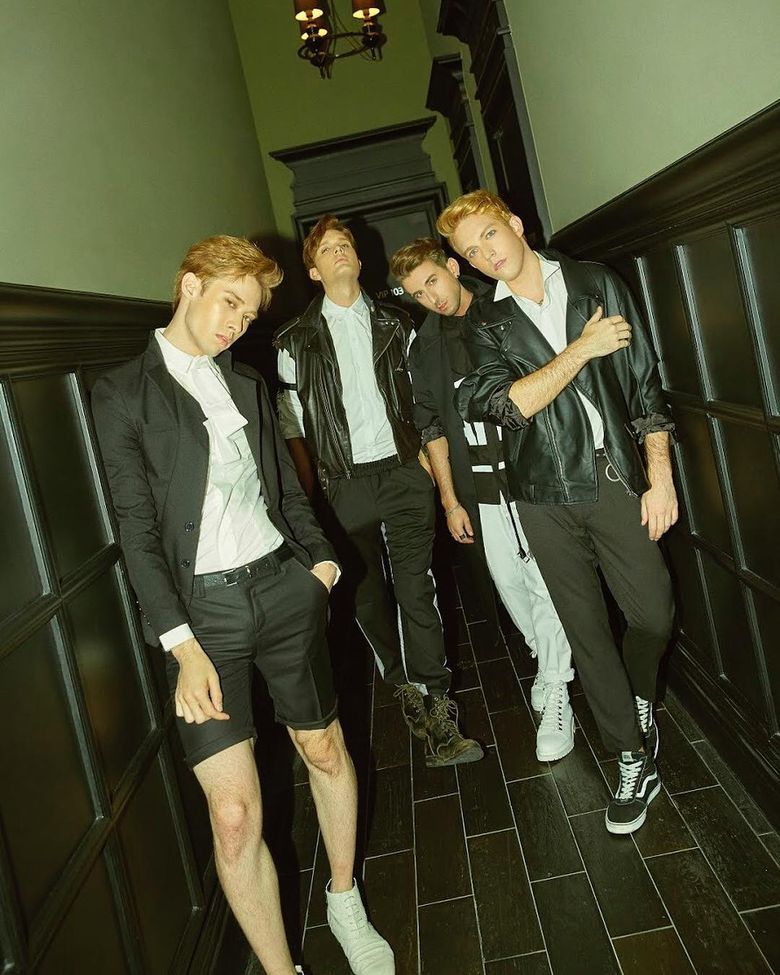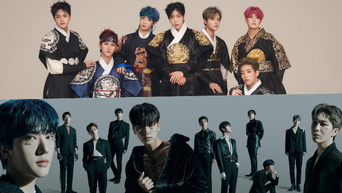The expansion of K-Pop has been rapid and had an exponential effect on fanbases. In doing so, it has also given birth to plentiful opportunities for non-Koreans to enter the K-Pop industry (both onstage and behind-the-scenes). As companies shift to a focus on global appeal, they have changed their offering to be more accommodating to worldwide target markets.Whilst they have done this in many ways. One of the notable ways that some companies have been gaining international appeal for their K-pop groups is by debuting more and more non-Korean idols.Holding global auditions and scouting has become a more common step in the group formation process in recent years. Before, global auditions and scouting used to mostly result in the debut of non-Korean idols who are of Asian descent, notably from countries such as Japan, China, Taiwan, etc. However, in recent years, the field has expanded to other countries/nationalities, too.In addition to the increase in industry-specific interest from the fans, the game has evolved significantly.Today we’ll take a closer look at how this evolution has brought non-Asian K-Pop idols, in particular, to the forefront. We will focus on the response that their presence in the industry has gained and the influencing factors.Note: In this article, the term ’non-Asian will refer to idols who do not have Asian birth parents. In some cases, non-Asian idols might be descendants of Asians (e.g. have an Asian grandparent or great grandparent, etc.) but for the sake of this article, we will consider their immediate lineage.
The who: exploring the source of this debate
Those who are against them
Firstly, we have to acknowledge the elephant in the room. Non-Asian K-Pop idols have been the center of huge amounts of backlash from K-Pop fans. There are many people who believe that they have no place in the industry as they do not visually or culturally represent the ‘K’ in K-Pop.However, in the same breath, non-Asian K-Pop idols have many supporters (both Korean and internationally). It is a matter of how you think about the influence they have in the industry and the meaning of K-Pop.Some K-Pop fans have even noted a disparity in the demographics where the general outrage on the topic stems from.This fan notes how most of the backlash non-Asian K-Pop idols get is from international K-Pop fans rather than Koreans. Many non-Asian idols have mentioned that Koreans tend to be welcoming toward them. Of course, there are Koreans who are opposed to the idea, but the same can be said for international fans. Just as there are people who will disagree with something, others may love that same idea.
Those who are for them
Some fans have even noted that the outrage comes from international fans because they want to gatekeep Korean culture.‘Gatekeeping’ refers to the act of controlling, and usually limiting, general access to something.This particular comment points out a double standard that they have observed among K-Pop fans.There are people who believe that these idols play an important role in the industry, which we will dive into later in the article.
The why: reasons non-Asian K-Pop idols have taken on the challenge
Intentions
Whilst non-Korean idols of Asian descent are largely accepted in the K-Pop industry, non-Asian K-Pop idols can often not say the same. One of the most plausible explanations for why this backlash exists may be that fans do not understand the intentions of these idols.“I wanted to be an idol who can give my fans hope to be a K-Pop artist even though it is a really difficult world to join. I know there are people who don’t have Asian ancestry that want to be a K-Pop idol and I wanted to show them that this is possible and give them hope.” - Blackswan’s Gaby (Brazilian)Like Blackswan’s Gaby, many of the non-Asian idols who want to debut simply want to show their love for K-Pop and create a vision of possibility, simultaneously.However, despite many non-Asian people wanting to debut, the reality is that it is not always possible for them.The non-Korean K-Pop market is still quite small despite the increase in non-Asian idols hoping to debut. In the below video, the BORN Star Training Center is featured, which is a K-Pop school in the United States. Their hope is to create opportunities for hopeful idols to become stars. The video also speaks about the prospects for non-Koreans to succeed once they have eventually entered the industry.
Representation
The vision of possibility that we mentioned earlier goes hand-in-hand with representation. A huge part of the reason that many fans support non-Asian idols is that they feel that their presence in the industry is a reflection of themselves.In the context of culture, ‘representation’ is a term used to emphasize the presence of a specific culture in an industry that they usually have low visibility or little presence in.Representation in media is considered important because of the impact it has in breaking down barriers/stereotypes and being a source of inspiration to others. It is an idea that considers the importance of the viewer, just as much as the importance of the characters/personas on a screen or stage.For example, when Korean-American actress Sandra Oh became the first woman of Asian descent in 39 years to win a Golden Globe for best actress in a TV drama in 2019, it was a massive step in terms of representation for Koreans in the Western entertainment industry. She was the first person of Asian descent to host the Golden Globes in 2019, too.The fact that she was the first Asian person to achieve these feats, just 3 years ago, speaks volumes about the representation of Asians in Hollywood, for example.K-Pop, by opening up its demographics, has already achieved similar feats.Alex Reid (former BP RaNia member) is well-known as the first African-American and first black K-Pop idol.When asked how she felt about being the first black K-Pop idol, she said:“The reason I never thought I could be in K-Pop is because I never saw somebody like me in K-Pop. So, if I had a role model then I probably would’ve pursued it harder and actually felt like it was more than a dream. So, it feels good to know that other black girls like me who just love K-pop and get made fun of all the time can have someone to look up to.” - Alex Reid She added:“It’s really exciting for girls like me to have representation. It’s so important. I had never seen anyone who looked like me. No one. Not even close. If I saw someone who even sort of looked like me, maybe they’re Brazilian or Colombian, that would’ve been such a gamechanger. So, now it’s cool to say that there are girls who can look and be like, “There wasn’t one but now there’s another black K-Pop star and she has darker skin. With colorism, there are so many layers where people will favor a lighter skin. So, I think seeing more different complexions is so important because even with my representation there are plenty of girls who will think, “Maybe she got in because she’s lighter.”” - Alex Reid (former BP Rania member) on Blackswan Fatou’s debutSome fans are of the opinion that K-Pop takes inspiration from so many other cultures that it should be open to embracing artists from these cultures, too.Embracing these artists and cultures also facilitates conversations about the accuracy of the cultural representation in the industry (by non-Asians and Asians alike).Blackswan’s Fatou is Senegalese and Belgian. She is considered the second black K-Pop idol and the first African K-Pop idol in the industry.She recently did an interview where she reacted to how Koreans react to Blackswan’s music. For a fair amount of the video, she had to address and correct multiple stereotypes about black people.“There are a few points that sprang out to me. There are some kinds of stereotypes, but on the other side, they are very accepting and very welcoming. They give a lot of compliments.” - Blackswan’s Fatou (Belgian)You can watch the full video here.
The where: where the backlash against non-Asian idols stems from
Stereotypes, Conformity, Identity
However, there are times when representation can go wrong. The issue is not always that the representation is present, but rather how it is done. There are times when international fans want to be supportive of idols who are similar to them but feel misrepresented by them.One of the issues that fans have with non-Asian idols is the lengths they sometimes go to for the sake of trying to ‘fit in’. Whether they are attempting to fit into the industry as a non-Asian group or it is one person trying to fit into a majority Korean group as a non-Asian member; oftentimes their efforts become tone-deaf because they mistakenly enforce stereotypes about Asians. This misled attempt to ‘belong’ puts fans off, regardless of the intention.Non-Asian K-Pop idols tend to walk a fine tightrope where particular actions border on appreciation vs. appropriation of Korean culture. It is intersected by the line of conformity versus representing their own culture, too. Idols who fail to find the balance find themselves at the center of backlash.Take the boy group EXP Edition, for example. They debuted as an experiment connected to a project started by three Asian women who theorized about the success of non-Asian idols in K-Pop. However, K-Pop fans did not approve of the group’s intentions.Many also had issues with the quality of the group’s work considering the grueling hard work that goes into the K-Pop industry. They felt that EXP Edition is gimmicky and trying to profit off of the success of K-Pop and all of its encompassing elements. This is despite having one member who is half-Japanese.Other fans believe that the group is talented and would’ve done well had they been truer to their own identity.In most cases, the idols who embrace Korean culture but still maintain their own cultural identity, have received praise from fans. This includes learning the language to fluency, going through a trainee period, and being respectful/showing appreciation for the culture instead of appropriating it.
The how: processes that could/should be in place to accommodate non-Asian K-Pop idols in the industry
Other fans’ concern with non-Asian K-Pop idols is that in the process of becoming an inclusive industry, a portion of the K-Pop industry should remain locked off strictly for Koreans/Asians.There is a concern that the inclusion of so many idols, especially from Western countries, might lead to them taking over the industry.However, some fans disagree with the idea of there being an industry takeover threat in general.*This fan also highlighted the importance of representation in the K-Pop industry and how it can be improved.On another side of the debate, those who don’t mind or even enjoy the presence of non-Asian K-Pop idols in the industry, are more worried about what it means for their wellbeing. As Korean culture is quite unique, they worry about the mental and emotional load that those idols may have to carry in dealing with their identity (amidst a different culture).For example, some fans feel that Alex Reid was used as a commodity by her company when she was still active as an idol. To them, it was a case of using her international identity as a PR tool and not giving her the proper treatment or recognition for her talents.There were several instances when Alex would only do her parts on stage then get off of the stage or stand still in the corner for the remainder of the performance. Many felt that she was being treated like a featuring artist. This raised alarms about her company’s intentions for having her in the group and about how she was being treated.In this performance of ‘Start A Fire’ you can see how Alex leaves the stage after her part and then comes back for the ending. Alex has often spoken out about her time in the group and mentioned an instance where she was continuously excluded from group activities without explanation. She has mentioned instances where she was not accounted for in basic things that are factored into running a K-Pop group, such as hair and makeup. She would often have to do her own hair and makeup because none of the stylists could handle doing it, which meant that she had to wake up a lot earlier to get everything done and then sit doing nothing during the allotted hair and makeup time. In the end, for a number of reasons (not just the ones we have mentioned), she chose to leave the group and pursue other endeavors.It has become profitable for agencies to debut non-Korean idols because they attract a larger demographic for their fanbase and can guarantee an element of a group’s success overseas. This has led to an increase in the presence of non-Korean idols among debut lineups.“I think the bottom line is that if you want a member… There were perks to having me in the group which were like, “Oh, she’s different! We’re gonna get publicity off of this and that,” if you’re gonna have the positive side and reap the benefits… You have to think of those things. Being different is cool in front of the camera, but what does it take to sustain having somebody different in your group off-camera?” - Alex ReidThere is still much room for improvement when it comes to the inclusion and representation of international audiences on the K-Pop stage.What do you think about non-Asian K-Pop idols? Do you think that they belong in K-Pop? Let us know in the comments! How K-Pop Marketing Trends Have Changed Over The Years Using Boy Groups As A Case Study FANBUZZ|Jun 8, 2022 Fans Debate Whether Alternate Universes And Lore Are An Essential Part Of K-Pop Group Concepts FANBUZZ|May 27, 2022













